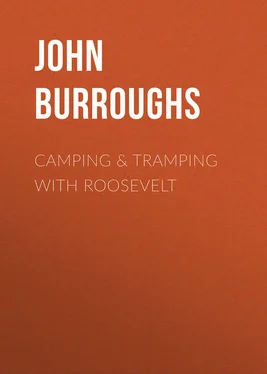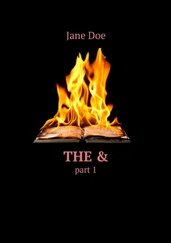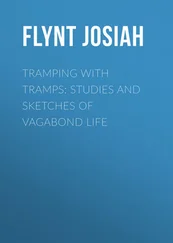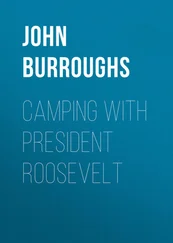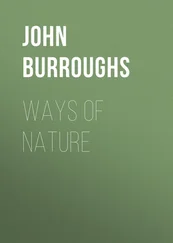John Burroughs - Camping & Tramping with Roosevelt
Здесь есть возможность читать онлайн «John Burroughs - Camping & Tramping with Roosevelt» — ознакомительный отрывок электронной книги совершенно бесплатно, а после прочтения отрывка купить полную версию. В некоторых случаях можно слушать аудио, скачать через торрент в формате fb2 и присутствует краткое содержание. Жанр: foreign_antique, foreign_prose, на английском языке. Описание произведения, (предисловие) а так же отзывы посетителей доступны на портале библиотеки ЛибКат.
- Название:Camping & Tramping with Roosevelt
- Автор:
- Жанр:
- Год:неизвестен
- ISBN:нет данных
- Рейтинг книги:5 / 5. Голосов: 1
-
Избранное:Добавить в избранное
- Отзывы:
-
Ваша оценка:
- 100
- 1
- 2
- 3
- 4
- 5
Camping & Tramping with Roosevelt: краткое содержание, описание и аннотация
Предлагаем к чтению аннотацию, описание, краткое содержание или предисловие (зависит от того, что написал сам автор книги «Camping & Tramping with Roosevelt»). Если вы не нашли необходимую информацию о книге — напишите в комментариях, мы постараемся отыскать её.
Camping & Tramping with Roosevelt — читать онлайн ознакомительный отрывок
Ниже представлен текст книги, разбитый по страницам. Система сохранения места последней прочитанной страницы, позволяет с удобством читать онлайн бесплатно книгу «Camping & Tramping with Roosevelt», без необходимости каждый раз заново искать на чём Вы остановились. Поставьте закладку, и сможете в любой момент перейти на страницу, на которой закончили чтение.
Интервал:
Закладка:
John Burroughs
Camping & Tramping with Roosevelt
INTRODUCTION
This little volume really needs no introduction; the two sketches of which it is made explain and, I hope, justify themselves. But there is one phase of the President's many-sided character upon which I should like to lay especial emphasis, namely, his natural history bent and knowledge. Amid all his absorbing interests and masterful activities in other fields, his interest and his authority in practical natural history are by no means the least. I long ago had very direct proof of this statement. In some of my English sketches, following a visit to that island in 1882, I had, rather by implication than by positive statement, inclined to the opinion that the European forms of animal life were, as a rule, larger and more hardy and prolific than the corresponding forms in this country. Roosevelt could not let this statement or suggestion go unchallenged, and the letter which I received from him in 1892, touching these things, is of double interest at this time, as showing one phase of his radical Americanism, while it exhibits him as a thoroughgoing naturalist. I am sure my readers will welcome the gist of this letter. After some preliminary remarks he says: —
"The point of which I am speaking is where you say that the Old World forms of animal life are coarser, stronger, fiercer, and more fertile than those of the New World." (My statement was not quite so sweeping as this.) "Now I don't think that this is so; at least, comparing the forms which are typical of North America and of northern Asia and Europe, which together form but one province of animal life.
"Many animals and birds which increase very fast in new countries, and which are commonly spoken of as European in their origin, are really as alien to Europe as to their new homes. Thus the rabbit, rat, and mouse are just as truly interlopers in England as in the United States and Australia, having moved thither apparently within historic times, the rabbit from North Africa, the others from southern Asia; and one could no more generalize upon the comparative weakness of the American fauna from these cases of intruders than one could generalize from them upon the comparative weakness of the British, German, and French wild animals. Our wood mouse or deer mouse retreats before the ordinary house mouse in exactly the same way that the European wood mouse does, and not a whit more. Our big wood rat stands in the same relation to the house rat. Casting aside these cases, it seems to me, looking at the mammals, that it would be quite impossible to generalize as to whether those of the Old or the New World are more fecund, are the fiercest, the hardiest, or the strongest. A great many cases could be cited on both sides. Our moose and caribou are, in certain of their varieties, rather larger than the Old World forms of the same species. If there is any difference between the beavers of the two countries, it is in the same direction. So with the great family of the field mice. The largest true arvicola seems to be the yellow-cheeked mouse of Hudson's Bay, and the biggest representative of the family on either continent is the muskrat. In most of its varieties the wolf of North America seems to be inferior in strength and courage to that of northern Europe and Asia; but the direct reverse is true with the grizzly bear, which is merely a somewhat larger and fiercer variety of the common European brown bear. On the whole, the Old World bison, or so-called aurochs, appears to be somewhat more formidable than its American brother; but the difference against the latter is not anything like as great as the difference in favor of the American wapiti, which is nothing but a giant representative of the comparatively puny European stag. So with the red fox. The fox of New York is about the size of that of France, and inferior in size to that of Scotland; the latter in turn is inferior in size to the big fox of the upper Missouri, while the largest of all comes from British America. There is no basis for the belief that the red fox was imported here from Europe; its skin was a common article of trade with the Canadian fur traders from the earliest times. On the other hand, the European lynx is much bigger than the American. The weasels afford cases in point, showing how hard it is to make a general law on the subject. The American badger is very much smaller than the European, and the American otter very much larger than the European otter. Our pine marten, or sable, compared with that of Europe, shows the very qualities of which you speak; that is, its skull is slenderer, the bones are somewhat lighter, the teeth less stout, the form showing more grace and less strength. But curiously enough this is reversed, with even greater emphasis, in the minks of the two continents, the American being much the largest and strongest, with stouter teeth, bigger bones, and a stronger animal in every way. The little weasel is on the whole smaller here, while the big weasel, or stoat, is, in some of its varieties at least, largest on this side; and, of the true weasels, the largest of all is the so-called fisher, a purely American beast, a fierce and hardy animal which habitually preys upon as hard fighting a creature as the raccoon, and which could eat all the Asiatic and European varieties of weasels without an effort.
"About birds I should be far less competent to advance arguments, and especially, my dear sir, to you; but it seems to me that two of the most self-asserting and hardiest of our families of birds are the tyrant flycatchers, of which the kingbird is chief, and the blackbirds, or grackles, with the meadow lark at their head, both characteristically American.
"Did you ever look over the medical statistics of the half million men drafted during the Civil War? They include men of every race and color, and from every country of Europe, and from every State in the Union; and so many men were measured that the average of the measurements is probably pretty fair. From these it would appear that the physical type in the Eastern States had undoubtedly degenerated. The man from New York or New England, unless he came from the lumbering districts, though as tall as the Englishman or Irishman, was distinctly lighter built, and especially was narrower across the chest; but the finest men physically of all were the Kentuckians and Tennesseeans. After them came the Scandinavians, then the Scotch, then the people from several of the Western States, such as Wisconsin and Minnesota, then the Irish, then the Germans, then the English, etc. The decay of vitality, especially as shown in the decreasing fertility of the New England and, indeed, New York stock, is very alarming; but the most prolific peoples on this continent, whether of native or foreign origin, are the native whites of the southern Alleghany region in Kentucky and Tennessee, the Virginians, and the Carolinians, and also the French of Canada.
"It will be difficult to frame a general law of fecundity in comparing the effects upon human life of long residence on the two continents when we see that the Frenchman in Canada is healthy and enormously fertile, while the old French stock is at the stationary point in France, the direct reverse being the case when the English of Old and of New England are compared, and the decision being again reversed if we compare the English with the mountain whites of the Southern States."
CAMPING WITH PRESIDENT ROOSEVELT
At the time I made the trip to Yellowstone Park with President Roosevelt in the spring of 1903, I promised some friends to write up my impressions of the President and of the Park, but I have been slow in getting around to it. The President himself, having the absolute leisure and peace of the White House, wrote his account of the trip nearly two years ago! But with the stress and strain of my life at "Slabsides," – administering the affairs of so many of the wild creatures of the woods about me, – I have not till this blessed season (fall of 1905) found the time to put on record an account of the most interesting thing I saw in that wonderful land, which, of course, was the President himself.
Читать дальшеИнтервал:
Закладка:
Похожие книги на «Camping & Tramping with Roosevelt»
Представляем Вашему вниманию похожие книги на «Camping & Tramping with Roosevelt» списком для выбора. Мы отобрали схожую по названию и смыслу литературу в надежде предоставить читателям больше вариантов отыскать новые, интересные, ещё непрочитанные произведения.
Обсуждение, отзывы о книге «Camping & Tramping with Roosevelt» и просто собственные мнения читателей. Оставьте ваши комментарии, напишите, что Вы думаете о произведении, его смысле или главных героях. Укажите что конкретно понравилось, а что нет, и почему Вы так считаете.
